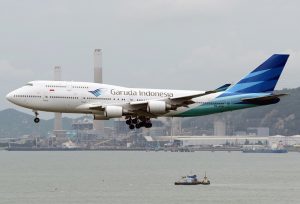If you look at the 2019 annual report for Garuda Airlines, Indonesia’s national carrier, you may notice a subsidiary called PT Garuda Indonesia Holiday France. According to their corporate website, GIH France is meant to “provide a wide selection of the best holidays of various travel service providers selected for tourists and corporations domiciled in Paris, France.” The surprising thing is that in 2019 the company booked $763.8 million in revenue and held $1 billion in assets. Apparently, French people really like to vacation in Bali.
Although it is pitched in a lot of its corporate material as a travel agency, this subsidiary’s main function is to lease airplanes, and it is most likely incorporated in France because that is where Airbus is headquartered. As of 2019, GIH France was leasing 140 aircraft, two thirds of Garuda’s entire fleet of 210. This is not unusual in the world of airlines – airplanes are frequently leased rather than purchased and there is a reason for that.
Under Indonesian accounting rules, certain types of leases can be treated as expenses rather than long-term liabilities – meaning the lease payments are expensed when incurred, and the total outstanding value of the lease does not show up as a liability on the balance sheet. For instance when looking at Garuda’s 2019 liabilities of $3.26 billion, that doesn’t include $6.7 billion that it owes on its 189 leased aircraft. The company is only obliged to record the current minimum payment that it makes, not the total amount owed.
This might seem like an attempt to hide the true scale of its liabilities, but it’s a fairly standard industry practice predicated on one key assumption – that the company will be able to maintain consistent cashflow. In recent years this seemed like a given. Along with Lion, Garuda dominates the domestic market and airline traffic in Indonesia has been booming. Garuda Group (including the budget airline Citilink) saw passenger numbers rise from 32.96 million in 2015 to 38.44 million in 2018. But with the sudden stop in flights due to COVID-19, Garuda – along with every other carrier in the world – has a problem on its hands.
The Indonesian airline is not alone in structuring its operations this way. Many airlines need a constant flow of cash to stay alive, using ticket revenue to pay down short-term working capital loans or stay ahead of minimum payments on multi-billion dollar lease obligations. That is why they have been some of the first dominoes to fall in this crisis. Many airlines simply cannot survive without cash.
Hardly any carrier in Southeast Asia has been spared. Thai Airways already filed for bankruptcy in May, with the Associated Press reporting the company had $9.6 billion in debt after posting three years of consecutive losses. Vietnam’s flagship carrier, Vietnam Airlines, has had to deny rumors it was on the brink of financial collapse while Malaysia Airlines, which is owned by the country’s sovereign wealth fund and was already struggling before COVID-19, is reportedly almost out of cash.
It is no surprise that a pandemic which has shut down air travel is causing airlines to suffer. There are, however, certain ways that state-owned airlines are better equipped to weather such turbulent times. Privately-owned airlines are accountable to their shareholders who demand dividends and security for their investments. That is one reason Air Asia is currently liquidating some of its regional arms and fighting with creditors over its $15.3 billion debt.
By comparison, the ownership structure of Garuda insulates it somewhat from such pressures. About 86 percent of Garuda is owned either by the state or Indonesian business mogul Chairul Tanjung. It is therefore unlikely there will be a lot of pressure from shareholders about the losses the airline is taking right now. Chairul, who Forbes reports was the 9th wealthiest person in Indonesia last year, worth some $3.7 billion, can probably survive if Garuda doesn’t pay a dividend.
Digging deeper into Garuda’s books reveals that $540 million of its short-term loans were issued by the country’s three largest state-owned banks. Given the circumstances, these lenders are likely to be fairly flexible about restructuring or rolling over those loans until the crisis is over. Indeed, this was Garuda’s experience in June 2020, when a $500 million sukuk bond came due. Over 90 percent of the bondholders agreed to roll it over for another 3 years.
This is a case where direct state ownership in the airline sector may give Indonesia’s flagship carrier a bit more flexibility in dealing with COVID-19. But the reality is that much of the industry runs on a combustible mix of short-term debt and cash, leaving it vulnerable to any sudden stop – and that is an issue that regulators and governments will need to grapple with long after the virus is gone.

































